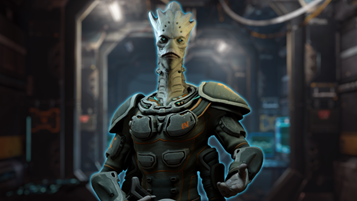
Galactic Civilizations III: Crusade is an expansion pack for Stardock's popular 4X space strategy game, Galactic Civilizations III. Crusade is a top-to-bottom update of the entire game. This article will walk you through what's new, what's changed and try to explain it for those who may not be familiar with the series.
The Specs
- Title: Galactic Civilizations III: Crusade
- Platform: Windows PC, 64-bit
- Price: $19.99 if you already have Galactic Civilizations III, $39.99 for new players.
- Release Date: May 4 at www.galciv3.com or at Steam, GOG, Humble Bundle and elsewhere.
Overview
The premise of the game is what happens when our civilization finally leaves its home world and begins exploring the galaxy? It's a gigantic sandbox in which the fate of your civilization is in your hands.
Players explore the galaxy, colonize new worlds, research new technologies, design ships, trade, negotiate and war with alien civilizations to see if their civilization can pass the test of time.
Features List
When Galactic Civilizations III first shipped, we released a feature comparison to show what was new over previous versions. Since I'm a bit of a cynic, I'll use the same chart (so that we can't pad it up since it's using the same one). For features that got additional attention I've placed an extra checkbox.
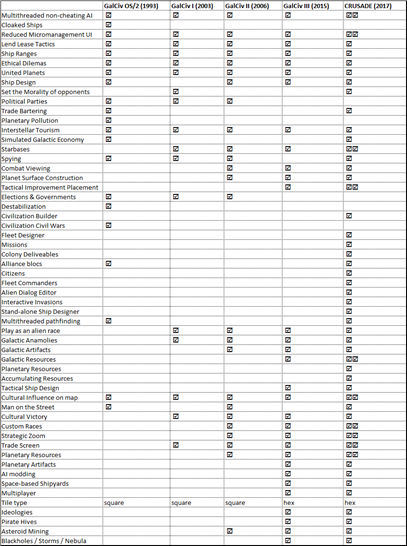
Click to enlarge (really!)
As you can see, Crusade is a massive expansion to the series.
NEW FEATURE: Civilization Builder
Have you ever seen a game get a "total conversion" so that it took place in a different universe? Crusade makes it easy for people to create their own civilizations and share them with others right from the main menu.

Choose what you want your civilization to look like.

Define what makes their species unique.

Assign what colors and materials their ships will have and what their UI will look like when you play as them.

Choose what the default ship classes they will use will look like (when you play against them, the AI will use them).

Can't find the ship you want? Press the "Get more ships" button and subscribe to your favorite creators works and bring them into the game.

Decide how the AI will play like, what they will say.

You can even decide what your citizens will look like and what their names will be.

When you're done, you can then share your new civ with others (note, it's considered rude to use other people's ship designs in your civ without their permission if you plan to upload it -- you can specify only your Steam friends can see it however).
NEW FEATURE: Global Ship Designer
GalCiv games have had ship design since 1993. However, Crusade brings the Ship Designer to the main menu to allow people to create design templates to share with others or modify. All the hulls parts and even starbase designs are accessible.

Choose what your ships will look like by default

Design starbases
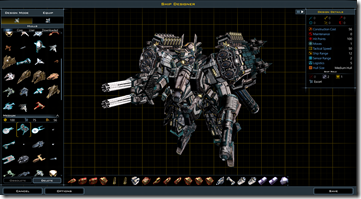
Your ships don't have to look like space ships...
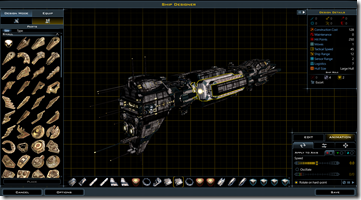
Ship parts can be animated, resized, rotated, etc.
When completed they can be uploaded to Steam.
NEW CIVILIZATIONS
While Crusade doesn't include any story-driven campaigns or scenarios, it does introduce new civilizations, each with its own history. Each civilization also includes its own unique ship parts that can be used for future designs.
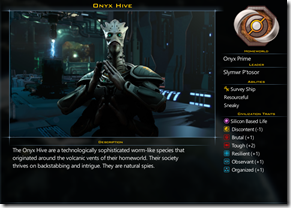
The silicon-based Onyx are master spies. Their ship components are made of rocks.
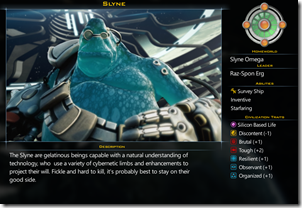
The gelatinous Slyne rely on technology for even the most basic of things.
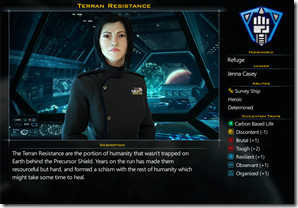
The Terran Resistance is an off-shoot of the humans from Earth
Jenna Casey, the leader of the Terran Resistance, was first introduced in Galactic Civilizations II: Dark Avatar (2008). Now, she gets an entire set of ships, technologies and other goodies to play with.
NEW FEATURE: CITIZENS
The Citizen feature is the most obvious and far-reaching change to Crusade. Your civilization is made up of billions of beings. Every so often, one of them will rise to become a true Galactic Citizen. How you choose to use your citizens shapes the way your civilization evolves.
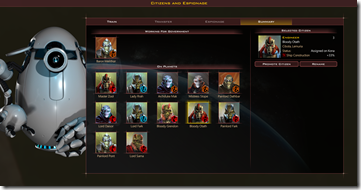
Every so many turns, a citizen is born. Each race gets its own citizens.
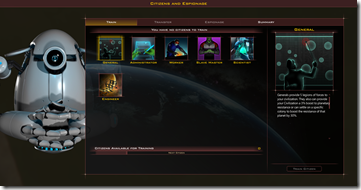
Players can then specialize those citizens based on what technologies and traits they have.
There are many different types of specializations you can train your citizens into and which ones are available at any given time depends on what traits your civilization has and what technologies you have.
Citizens aren't just a bundle of stats or modifiers. They can also have special abilities that unlock new game features. For example, Spies unlock the espionage feature. Generals unlock the invasion system. Commanders unlock the Privateer system and so on.
What a citizen can do also depends on where they are located. For example, you can assign a Scientist to your government and he will boost your research for your entire civilization. However, you can also send that same Scientist to live on a key research world to greatly boost just that single planet's research.
By contrast, a Diplomat can boost your civilization's influence overall or be sent to a foreign power to boost your relations with them or be sent to a specific world to boost that planet's influence.
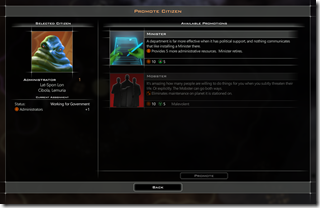
An Administrator lets you build more starbases and colonies but can also be promoted into a Mobster (if you're evil) or into a Minister if you have enough resources.
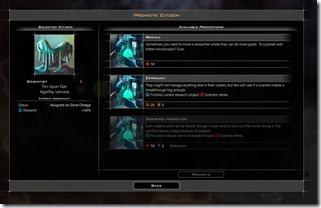
A scientist can be promoted to instantly discover a technology, be recalled from the planet or (if you play as malevolent) worked to death.
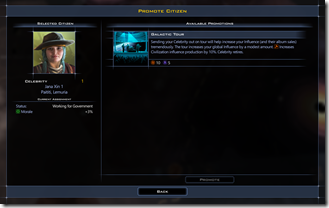
Celebrities can be sent on a galactic tour making your civilization ever more popular.
Needless to say, modders will probably do some crazy things with this feature.
NEW FEATURE: Interactive Invasions
For the first time, Galactic Civilizations is separating civilians and soldiers.
Previously, a player would construct an invasion transport and then transfer millions of civilians from the planet's population onto the transport. Then, the player would travel to a planet whose orbital defenses had been taken out and invade the planet with those conscripted civilians.
[Trivia: This system was originally developed to show off the AI in GalCiv as the system required a lot of pre-planning and coordination which couldn't realistically be done back in 1993 on a single threaded game].
In Crusade, by contrast, the player first has to specialize a citizen as a General who, in turn, can train up to 5 legions. Players can then load up their legions onto a transport and take it to the planet and invade.
However, there are some key gameplay changes:
- If the defending planet has no defending legions, the planet is instantly conquered. Thus, players can decide which planets matter the most.
- The transport is no longer consumed. That means, in theory, a single transport could conquer an entire civilization. This vastly reduces the late-game grind of conquering (and to be honest, we should have thought of this 10 years ago).
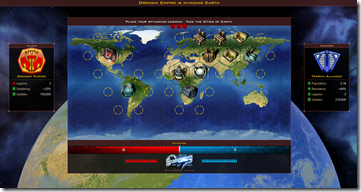
When the player arrives at the planet, they decide which tiles to land on. A planet is conquered when all the cities are taken.
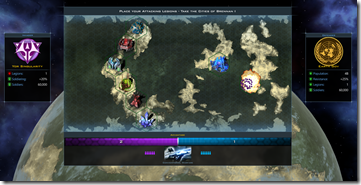
Any planetary improvements a legion traverses over is automatically destroyed unless defended. Hence, a player can use a single legion to try to raid a well defended planet.
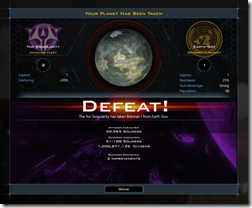
The statistical reality of a world-wide invasion is presented to the player.
NEW FEATURE: Missions and Deliverables
While not a specifically called out "feature", a big emphasis in Crusade has been to squash late game tedium. Strategy games are notoriously for having a late-game grind. The question is, how do you solve that?
Galactic Civilizations has always had civilizations surrender when they knew their cause was lost. That helped move the game along. But one gigantic area that still needed to be addressed is what to do about your colonies (the space 4X version of cities) late game when they are largely built out?
The most common solution is to create some type of "governor" to automate what planets are doing. The problem with that is that governors frequently do things that are contrary to the player's goals.
The solution that Crusade delivers comes in the form of Missions and Deliverables.
Shipyards can be queued up with various missions that can bring in more money, influence, technology and more. Since the player is essentially leader of the government, missions essentially turn a shipyard over to the private sector for a period of time in exchange for a piece of the action. For instance, the player can agree to let Treasure Hunters run the Shipyard for 12 turns in exchange for a cut of whatever treasure they find. At the end of the 12 turns, a small vessel, not controlled by the player, leaves port and travels to an unknown destination (the player can follow the ship, however).
Depending on what resources and technologies the player has, many different missions can be chosen from. What matters, however, is that the player doesn't have to queue up junk or turn it over to a "governor" or have their shipyard stand by idly.
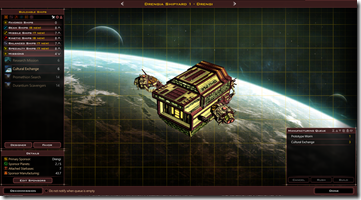
Players can queue up missions for private citizens in their civilization to go on in exchange for a piece of the action. This gives the shipyard something to do late game without the micromanagement and with a tangible, controllable benefit to the player.
Deliverables are the planet based equivalent to missions. Instead of turning over the planet to a governor (which the player can still do if they really want) they can queue up a series of long-term projects for the planet to engage in that deliver a specific result. This way, a player could, for instance, ask a planet to try to recruit more citizens. It may take many turns but it provides a benefit and keeps the planet in use, under player control, long after the planet has been built up.
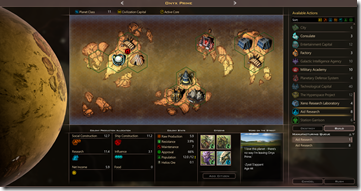
Planets can be assigned projects that deliver a specific result after a certain number of turns.
Different civilizations have different projects. For example, the robotic Yor increase their population this way while the humans might use it to station garrisons on the planet.
NEW FEATURE: ESPIONAGE
Espionage wasn't in the base game of Galactic Civilizations III and was, by far, the most requested feature. The challenge with espionage has always been, how do you make it meaningful without it overwhelming the entire game?
The answer returns to the Citizen system. Once the player researches Espionage, the Spy specialization becomes available.
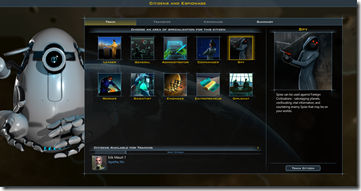
Train Spies
Since citizens are so special, spies, therefore are also rare but also powerful.
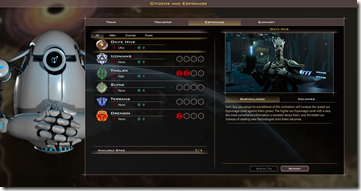
Place spies on alien civilizations to find out who they hate, who they may attack, and gain vital intelligence.
Players can also cripple a particular planet's economy with a spy by placing it on a specific tile on the planet. Doing so reduces the planet's overall production as well as shuts down whatever improvement it is on/
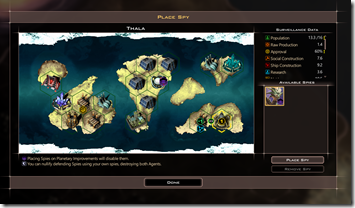
A well placed spy can hamper the growth of a competitor.
NEW FEATURE: Resource based economic system
Galactic Civilizations III's economy, like the previous games in the series, was based on the triad of research, manufacturing and wealth. Players used a global (or planetary) production wheel to focus their civilization.
The production wheel system worked well for small civilizations but became a frustrating (and often gamey) late game feature because the player felt they had to find the perfect balance every single turn across their entire empire (and that's without even considering the local production wheel on every planet).
The other weakness of the old system is that no economy is that simple. For starters, isn't there a big difference between military manufacturing and social construction? How about programs to make your people happy? How about farming? What about cultural development?
Crusade starts over with a new system that allows the player to control their economy by how they use their citizens.
For example, food is now a global resource. One planet can grow the food and other planets can consume them by building cities. This, in turn, creates the need for farmers who can accelerate that food production.
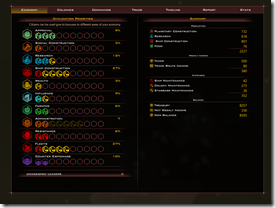
Players can have citizens specialize and work globally, ideal for large empires.
OR
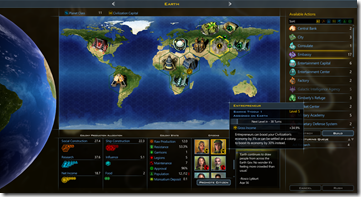
Citizens can be sent to a particular planet and give a large boost to that planet's economy. Over time, they level up.
In a 200 turn game, the player might only have 20 citizens, not an overwhelming number of units to manage and yet powerful tools for the player to control their economy.
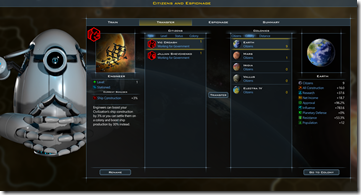
Keep your citizens on your key worlds for tall empires or keep them centralized for wide empires.
NEW FEATURE: Commanders & Privateers
Another challenge of strategy games that involve diplomacy is that peace can be...well...boring. Many strategy games resolve this by basically forcing players into war. This can be frustrating for players who have really tried to be peaceful.
While espionage does provide one covert way to help and harm players without going to war, there is another way as well: Privateers.
Players can specialize a citizen to be a Commander. Once assigned to a fleet, a Commander can be promoted into a Privateer.
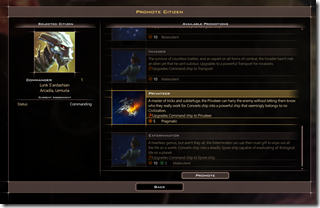
With some resources your Commander can be given a new, less public job.
A Privateer takes the best ship you can currently build and constructs it as an anonymous ship of war that players can use to wreak havoc on their competitors without officially going to war.
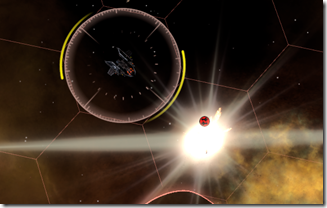
Enemy freighters, Civilian transports or even unprotected Transports can be brought low by a Privateer or two.
The Privateer feature opens the door for a civilization with a relatively weak military to keep stronger opponents off balance without actually engaging in direct confrontation.
To put this feature into perspective, beta testers have argued that the Commander / Privateer feature on its own could have been an expansion pack (GalCiv III: Mercenaries added Mercenaries, that was the thrust of that entire expansion).
NEW FEATURE: AI-Driven Diplomacy
Diplomacy in strategy games is hard. Computer players almost never do it well.
The Thalan, for example, are a time-traveling civilization and they remember how it was.
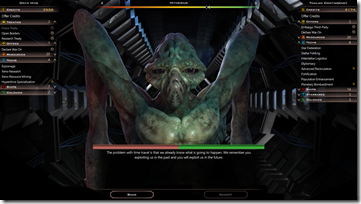
The Thalan remember you. Yes. YOU.
Crusade adds an entire background trade simulator. As a result, the trades it makes with you are complex, fair and useful. Because the simulator operates all the time, it can constantly look at what they want, what other players want (or should want) and offer it to them.
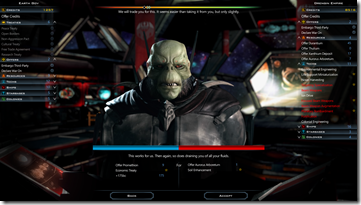
The AI is almost uncanny in its ability to predict what you would want for it and how much you would be willing to pay.
In addition, a value bar is now present on the trade screen to make trade much easier to engage in. Because resources are now central to the game, it was important to make it very easy to trade small quantities of various resources with minimal effort.
[[more to come]]